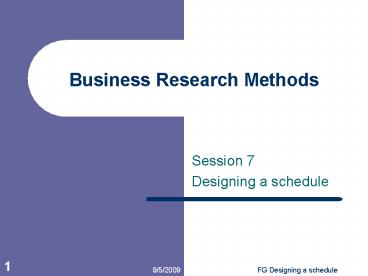Business Research Methods PowerPoint PPT Presentation
1 / 21
Title: Business Research Methods
1
Business Research Methods
- Session 7
- Designing a schedule
2
Designing a schedule
- Aims
- To outline what is meant by sound research
design. - To consider RQs
- Direct questions / questionnaires
- Indirect questions / interviews
3
Designing a schedule
- Sound research design?
- Will the evidence and my conclusions stand up to
closest scrutiny? - Important justify methodological approach / that
method (s) employed were suitable - Reliability
- Robson threats to
- subject area
- subject bias
- observer error
- observer bias
4
Designing a schedule
- Validity
- concerned with whether findings are really about
what they appear to be about - Robson threats
- History
- Testing
- Mortality
- Maturation
- Ambiguity about causal direction
- Genearlsability
- Logic leaps and false assumptions
5
Design
- How
- Where
- When
- Under what conditions
- Purpose
- exploratory
- description
- explanatory
- case study are appropriate for exploratory work
- surveys are appropriate for descriptive studies
- experiments are appropriate for explanatory
studies
6
How data answers research questions
- Decide purpose of research (descriptive /
explanatory / exploratory - start with RQ
- be more specific (what investigative questions do
you need to ask) - identify variables
- establish how to measure the data
7
(No Transcript)
8
RQ Methods of Collection
- Two way process
- RQ tell us about what you a researching
- Methods - how you are going to gather data
- Methods using direct questions
- questionnaires / structured interviews
- Semi/unstructured interviews
- Data types
- attitudes
- beliefs
- behaviour
- attributes
9
Methods using direct questions
- Good for descriptive /explanatory research
- include questionnaire / structured interviews/
telephone questionnaires - widely strategy survey
- Caution!
- Channel - pathway i.e. direct contact / indirect
10
Direct questions
- need to consider
- characteristics
- importance of reaching particular person
- contamination
- size of sample
- type of question/number
- fact or opinion
- open or closed
- ranking
11
Direct questions
- General principles
- is question clear / avoid jargon
- avoid personal questions / dont ask two
questions in one - avoid leading questions / avoid overlapping
categories - avoid unnecessary questions / dont make
unrealistic demands - check everyone understands question
- be specific
- order
- layout
- proof read/ pre text / pilot
12
Direct questions
- Actual schedule -
- introduction
- introduction to particular questions
- the questions
- prompts
- closing comments
- reminders to the interviewer about procedure
- Warm-up
- bio data
- main body
- questions
13
Direct Questions
- prompts
- filters
- cool off
- closure
- In general consider
- a) draw in respondents b) specific to general
- c) closed to open d) middle alternative
- e) agree/disagree f) question order
- g) variety h) not too long
- i) covering letter j) follow up letter
14
Dick Hobbs Bouncers The Art and Economics of
Intimidation
15
An example of research using direct questions.
Research explored the world of bouncers or
doormen within the context of a rapidly
developing night-time economy (NTE). It looked at
the development of this economy in terms of the
colonisation of after dark city spaces. to
establish the nature of the NTE. Researchers
believed there to be unprecedented numbers of
people pouring into the nighttime spaces of our
city centers. We were concerned via
ethnography, observations and interviews
to document the changing world of the bouncers,
and the strategies of violence that they employ.
We wished via a range of qualitative techniques
to interrogate the various systems of
registration and training that have evolved to
regulate the expanding business of bouncing, and
we were concerned to situate this expansion as
part of a continuum of pragmatic forms of
masculinity. .. Central to this project was the
covert ethnography, which was conducted in one
city. Formal interviews were conducted with
bouncers around the country, as well as many
interviews with police, local authority
personnel, pub and club owners, managers and
licensees, and training professionals. Three of
the research team went on courses to train as
registered bouncers.
16
Direct questions
- Interviews with Bouncers
- To find out about how they determine who enters
the club/pub. - What do you want to find out?
- Rules for entry?
- Is this to do with what people are wearing?
- Behaviour
- Are these ever broken?
- What do you do when you see a trouble maker
someone you know - a hard man?
17
Semi / unstructured interviews
- What is an interview?
- Structured or Unstructured
- skill
- time consuming
- channel
18
Semi / unstructured interviews
- Design
- indicative questions to start with
- general topic area
- probes
- basic
- explanatory
- focused
- silent
- draw out
- mirror
19
Semi / unstructured interviews
- Actual schedule
- introductory comments
- list of topic headings and possible key questions
- prompts
- closing comments
- Overall
- question types as before
- dont be long winded
- insensitive
- testing
20
Semi / unstructured interviews
- General points
- main purpose
- prepare /test / pilot
- be straightforward
- eliminate cues
- record
- enjoy it / be polite
- keep to time
- dress
- look interested
- body language
- thank you and good bye
21
Interviews
- To consider pressures on Police dealing with NTE
and drunken behaviour - To what extent do you think Bar owners are
complicit in encouraging drunkenness? open
ended? - What sort of control mechanisms do you have to
shut down problematic premises - Specific information

